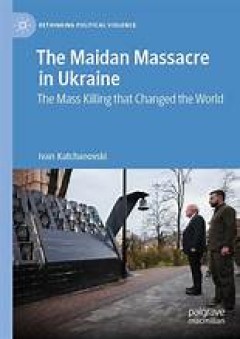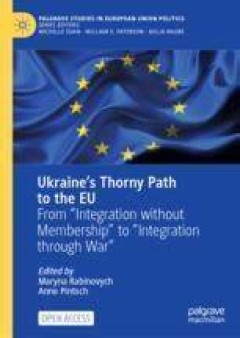Filter by

The Hard Edge of Soft Power = Mega-Events, Geopolitics, and Making Nations Gr…
This open access book explores the linkages between geopolitics and hosting mega-events. It encompasses and transcends the international and domestic dimensions of soft power to unpack how mega-events shape cities and societies through notions of unity and greatness, but also investigates local developments beneath the Potemkin surface of the global spectacle. Drawing on a global range of case …
- Edition
- -
- ISBN/ISSN
- 9789819635146
- Collation
- XVI, 153 hlm; ill., lamp.,
- Series Title
- -
- Call Number
- -

Gendered Vulnerabilities and Violence in Forced Migration : The Rohingya from…
This open access book investigates the gendered violence and vulnerabilities experienced by Rohingya men and women, drawing on qualitative data from refugee camps in Bangladesh. It shows that in Myanmar, men suffered torture and sexual violence, while women experienced physical, mental and sexual violence, legitimized by patriarchal norms. Sexual violence was wielded as a weapon to coerce their…
- Edition
- -
- ISBN/ISSN
- 9783031624353
- Collation
- -
- Series Title
- -
- Call Number
- -

European Union Support for Colombia's Peace Process
This open access book provides a comprehensive analysis of the EU's crucial support for the implementation of the Havana Peace Agreement between the Colombian government and the FARC-EP. It explores the use of new approaches and instruments that, despite some limitations and criticisms, could go beyond conventional liberal peace and provide useful lessons. Particular attention is paid to three …
- Edition
- 1
- ISBN/ISSN
- 978-3-031-24797-2
- Collation
- oer.unej.ac.id
- Series Title
- Rethinking Peace and Conflict Studies
- Call Number
- -

The Impact of Protracted Peace Processes on Identities in Conflict
This open access book discusses the impact of protracted peace processes on identities in conflict. It is concerned with how lingering peace processes affect, in the long-term, patterns of othering in protracted conflicts, and how this relates with enduring violence. Taking Israel and Palestine as a case study, the book traces different representations of success and failure of the protracted p…
- Edition
- 1
- ISBN/ISSN
- 978-3-031-16567-2
- Collation
- oer.unej.ac.id
- Series Title
- Rethinking Peace and Conflict Studies
- Call Number
- -

The Non-radicalisation of Muslims in Southern Europe
This open access book explains why southern European countries with significant Muslim communities have experienced few religiously inspired violent attacks – or have avoided the kind of securitised response to such attacks seen in many other Western states. The authors provide a unique contribution to the literature on violent extremism – which has traditionally focused on countries such a…
- Edition
- 1
- ISBN/ISSN
- 978-3-031-71996-7
- Collation
- oer.unej.ac.id
- Series Title
- Rethinking Political Violence
- Call Number
- -

The Maidan Massacre in Ukraine
This open access book provides a comprehensive analysis of the Maidan massacre in Ukraine. It uses a theoretical framework of rational choice, moral hazard, state- repression backfire, and Weberian ideas about rational action to explore the massacre. The book draws on publicly available videos, photos and audio recordings of the massacre in English, Ukrainian, Russian, Polish and other langu…
- Edition
- 1
- ISBN/ISSN
- 978-3-031-67121-0
- Collation
- oer.unej.ac.id
- Series Title
- Rethinking Political Violence
- Call Number
- -

Ukraine’s Thorny Path to the EU
This interdisciplinary book takes stock of Ukraine’s thorny European integration path in the last two decades. Engaging many Ukrainian academics and practitioners, the book seeks to offer a first-hand insight into how Ukraine moves towards EU membership, while in war with Russia, and which ‘stumbling blocks’ it encounters.
- Edition
- 1
- ISBN/ISSN
- 978-3-031-69154-6
- Collation
- oer.unej.ac.id
- Series Title
- Palgrave Studies in European Union Politics
- Call Number
- -

Multiculturalism and Conflict Reconciliation in the Asia-Pacific
This book is open access under a CC BY license. This edited collection focuses on theories, language and migration in relation to multiculturalism in Japan and the Asia-Pacific. Each chapter aims to provide alternative understandings to current conflicts that have arisen due to immigration and policies related to education, politics, language, work, citizenship and identity.
- Edition
- -
- ISBN/ISSN
- 978-1-137-40360-5
- Collation
- oer.unej.ac.id
- Series Title
- -
- Call Number
- -

Fachkräftemigration – Pflegenotstand – Nächstenliebe: Katholische Fraue…
Dieses Open-Access-Buch verfolgt das Ziel, die Migrationsbewegungen aus Indien in den 1960er Jahren anhand transdisziplinärer Ansätze der Historischen Migrationsforschung aufzuarbeiten. In der jungen Bundesrepublik führte der Wirtschaftsboom der Nachkriegszeit zur Modernisierung und zum Ausbau von Pflegeeinrichtungen. Dabei entstand eine kaum zu stillende geschlechtsspezifische Nachfrage nac…
- Edition
- 1
- ISBN/ISSN
- 9783658460822
- Collation
- XXI, 416 hlm; ill., lamp.,
- Series Title
- -
- Call Number
- -

The Handbook of Marriage in the Arab World
This open access handbook combines multiple theoretical and practical approaches for enabling a nuanced understanding of the phenomenon of marriage in the Arab world. Adopting a holistic, interdisciplinary approach, it provides a framework for the contextual and macro factors surrounding and affecting marriage in the Arab countries. It looks at the different types of marriage, whether tradition…
- Edition
- 1
- ISBN/ISSN
- 9789819776207
- Collation
- XXX, 436 ill; lamp
- Series Title
- 17
- Call Number
- -
 Computer Science, Information & General Works
Computer Science, Information & General Works  Philosophy & Psychology
Philosophy & Psychology  Religion
Religion  Social Sciences
Social Sciences  Language
Language  Pure Science
Pure Science  Applied Sciences
Applied Sciences  Art & Recreation
Art & Recreation  Literature
Literature  History & Geography
History & Geography